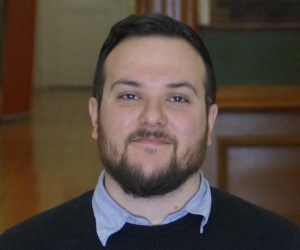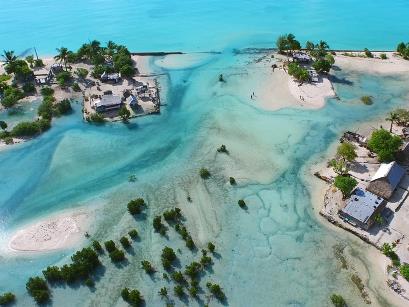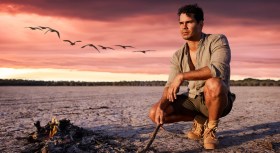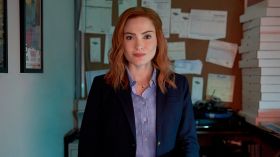Image: A world about to disappear with global warming. Kiribati, in the Pacific islands, from
Imagine having to watch 300 environmental-themed films. At the end of it all, wouldn’t you be weeping tears of blood, or slitting your wrists with sadness at the plight of poor old Mother Earth?
Actually, no, says Nathan Senn, Program Director of the Environmental Film Festival Australia, which is screening in Melbourne from 11-19 October at ACMI and Palace Westgarth. Senn heads up a team of eight programmers who sort through around 300 features and 300 shorts, selecting 40-odd films each year to screen at the festival. He reckons that ultimately, it’s an uplifting experience.
Talking to Screenhub on the phone, Senn admits there are some very sad stories and some very bleak facts. Nevertheless, ‘it’s actually inspiring to watch people fighting against environmental destruction, whether that’s as subjects of the films, or as filmmakers and activists who are giving their time and resources to make things better.’
Face the Films
According to Senn, the programmers at EFFA are very mindful of not overwhelming audiences with negativity – despite this year’s festival being themed ‘Face the Films’ – an almost bossy incitement for viewers to face up to the facts around climate change and the future impacts of today’s decisions. ‘One thing you absolutely don’t want is people walking away feeling completely despondent and thinking it’s too late and there’s nothing that can be done. That couldn’t be further from the truth. Tonally, the program this year is full of films that are positive. I’d urge people to approach the films from that perspective and think about the people on the front lines who are doing amazing work, really positive work.’
He cites as an example the film Anote’s Ark, directed by Matthieu Rytz, which follows Anote Tong, former Kiribati president, as he campaigns about the plight of his country, a collection of tiny Pacific islands likely to disappear underwater in the next 60 years. ‘We are thrilled to be bringing Anote out for the festival and as a special guest,’ says Senn. ‘He will introduce the film and do a Q&A, talking about the plight of his people, who he’s trying to relocate. It will be really inspiring and hopefully will help people to connect some dots and make some difference. We’re an activist festival and we want people to feel energised by the films.’
Anote’s Ark – Official Trailer – Sundance 2018 from EyeSteelFilm on Vimeo.
Another inspiring highlight, according to Senn, is opening night film Into the Okavango, directed by Neil Gelinas. It’s the Australian premiere of a film about a passionate conservationist travelling down the Okavango River delta in Africa. Senn says one of the takeaways from it is that ‘there are people and organisations, like the National Geographic who made it, who are playing a big part in helping to make changes.’
Into The Okavango — Trailer from Science Design on Vimeo.
Heart on Sleeve
Begun in 2000 (as the Environmental Film Festival Melbourne), EFFA is a not for profit DGR (Deductible Gift Recipient) charity run entirely by volunteers. You may remember that DGR eligibility with the Australian Taxation Office has played an important part in allowing the Documentary Australia Foundation to assist filmmakers with social change agendas
According to its Mission Statement, EFFA wants to be ‘a catalyst for positive and sustainable change,’ and to ‘connect conscious consumers with ethical organisations, then direct them to act.’. This year’s EFFA is co-directed by Chris Gerbing and Brooke Daly, and the principal sponsor is Bank Australia, a cooperative bank based in Kew, Melbourne, that advertises its refusal to lend to the fossil fuel industry. The festival says it is committed to having 30 per cent of its films made by Australians
One imagines there are sneaky corporate propagandist films that would love to reach an audience through such an event. Senn says yes, such films are frequently submitted. ‘It is quite common and you can’t blame them for trying. I shouldn’t name any names, but it’s pretty easy for us to tell what is a legitimate film from what is just a
The Life of a Festival Programmer
The life of a film festival programmer seems mysterious and glamorous – unless of

Image: Nathan Senn, EFFA Program Director and a real film tragic.
Afterwards, he was burnt out and disillusioned with academic life. He wondered how he could just sit in a dark room and watch films one after the other, the way he loved to do each year at the Melbourne International Film Festival. Then came the chance to work as a programmer for the Sydney Underground Film Festival (SUFF). He’s still employed in a part-time role there for about nine months of the year. ‘I love working for SUFF,’ he says, ‘because it’s a festival where we get to program a lot of things that are really weird and “out there” and fun. It’s a good balance to be working for that event as well as EFFA.’
So how as working for EFFA changed him personally? ‘It’s definitely been a massive eye opening. Watching that much environmental content you really get a sense of how dire things are and how much work needs to be done. But from a purely cinematic perspective, it’s fascinating to see the interesting new things that are being done with
Three personal picks from the program
It’s no surprise to find that Senn’s personal picks include some for the pure cinephile with no activist agenda at all. Here they are, along with his words about them:
Welcome to Sodom (Christian Krones, Florian Weigensamer): ‘This is a really beautiful film set in Ghana in Africa at an electronic waste dump site, one of the most toxic sites on earth. But it’s also the home of about 6000 people who live and work there. On the
The Ancient Woods (Mindaugas Survila): ‘This is a really unconventional wildlife documentary. No dialogue, no soundtrack, it’s completely silent. Set in the old growth forest of Lithuania it has beautiful shots of animals in this forest
Sleep Has Her House (Scott Barley): ‘I’m
Sleep Has Her House (Scott Barley) Trailer from Scott Barley on Vimeo.
The Environmental Film Festival Australia 2018 screens from 11 to 19 October at ACMI and Palace Westgarth Cinema. For program details and info, go to www.effa.org.au.





